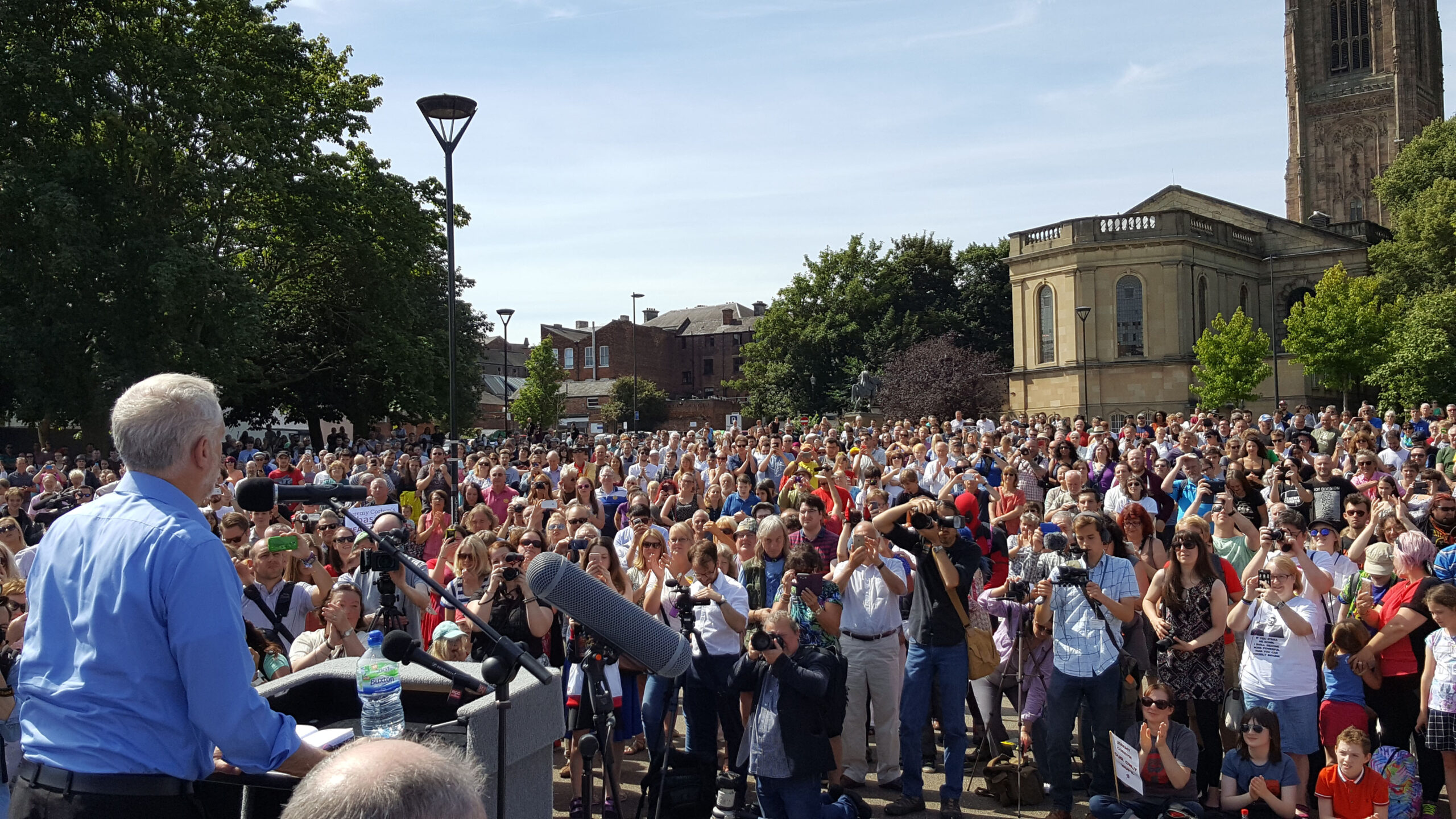Correspondence between Socialist Party general secretary Peter Taaffe and Labour Party general secretary Jennie Formby
Below, we reprint correspondence between Jennie Formby, general secretary of the Labour Party, and Peter Taaffe, Socialist Party general secretary, on the Socialist Party’s request to affiliate to Labour.
It is more than three years since Jeremy Corbyn was first elected Labour leader. Despite repeated attempts to remove him, he has been kept in place by the popularity of his anti-austerity programme.
In response, the pro-capitalist wing of Labour keeps stepping up its attempts to undermine him. The capitalist class remains afraid that a Jeremy Corbyn-led government could raise the hopes of millions. They fear this would unleash a powerful movement to improve the lives of the working class majority which could threaten their rotten, profit-driven system. It is to prevent this that the Blairite MPs are moving might and main to defeat Corbyn.
The options they are reported to be considering include removing him, splitting and forming a new pro-capitalist party, or waiting for Labour to win a general election and then preventing him becoming prime minister.
From day one, the Socialist Party has warned that attempting to pacify the Blairite saboteurs won’t work. Only turning the clock of history back to the days of pro-capitalist New Labour would satisfy them.
We understand that some Corbyn supporters, desperate for a Labour government, are fearful of deselecting the hated Blairites, because they worry it will push them to split and that this could damage Labour’s chances in a general election. However, we think this view is mistaken. Inside or outside the Labour Party, these traitors are determined to damage Corbyn’s chances up to a general election and beyond. If, after a general election, the majority of the parliamentary Labour Party is still pro-capitalist, it will act to prevent Corbyn implementing his programme.
By contrast, if they go it will leave Corbyn free to put a clear socialist programme in a general election. As the snap election showed last year, standing on an anti-austerity programme is popular. On that occasion, despite the bile from the right-wing press, Labour increased its vote by more than three million in the biggest increase in the vote for any party since 1945.
Imagine if we had Labour councils across the country that, instead of implementing Tory austerity, were defying the government to defend and improve public services, including building large numbers of council houses. That would create real momentum towards a Labour general election victory. Instead, unfortunately, Labour councils are still dominated by pro-austerity councillors. It is this, and not anti-austerity candidates standing against some of the worst cutters, which could potentially damage Corbyn’s election chances.
Over recent decades, the transformation of Labour into pro-capitalist New Labour had left the working class majority with no mass political voice. Our class would be immeasurably stronger if it that had not happened. The election of Jeremy Corbyn as Labour leader, however, was the first step to potentially transforming Labour into a mass workers’ party. To finish the job requires democratising the party, in order to be able to elect representatives at every level – from the council chamber to parliament – who are prepared to fight for an anti-austerity programme.
Over the next week, Labour Party conference will be hearing the report of the Democracy Review, which was set up at last year’s conference to look at ways to democratise the party. We welcome any democratic step forward that is agreed at the conference, but what is needed is a root and branch transformation of Labour’s structure. Alongside the immediate reintroduction of mandatory reselection of MPs, we need the democratisation of the selection of Labour councillors. The restoration of trade union rights within the Labour Party, under the democratic control of trade union members, is also vital.
All those who have been expelled from the Labour Party for their socialist ideas should be readmitted.
The Socialist Party also argues that all genuinely anti-austerity forces should be encouraged to affiliate to the Labour Party on the above basis, including ourselves.
When the Labour Party was founded it was a federation of different trade union and socialist organisations, coming together to fight for working-class political representation. A few remnants of this remain even today. Unsurprisingly, however, given the complete dominance of the pro-capitalist wing of Labour prior to Corbyn’s election, there are few left-led political organisations under the Labour umbrella. The Socialist Party (then the Militant Tendency) was among the first to be expelled from the Labour Party, as the Blairites consolidated their grip on power. Today the leadership of some affiliated organisations – such as the right-wing Jewish Labour Movement – have been at the forefront of the campaign against Corbyn.
It is urgent that the Labour Party is transformed so it can bring together all those who want to fight in the interests of the working and middle class majority, and for the election of a Jeremy Corbyn-led government on a socialist programme. This means removing from office all those who are hell-bent on sabotaging that goal.
To: Jennie Formby, Labour Party general secretary
6 April 2018
Dear Jennie,
I am writing to you on behalf of the Socialist Party (previously the Militant). We would like to meet with you to discuss the possibility of our becoming an affiliate of the Labour Party. From the beginning we have enthusiastically supported Jeremy Corbyn’s election as leader of the Labour Party, which has offered the possibility of transforming Labour into a clear anti-austerity party, based on the trade unions and the working class. Clearly, your appointment as general secretary, replacing Iain McNicol, is an important step towards the renewal of the party along these lines.
Nonetheless, as is shown by the recently renewed, baseless attacks by Labour MPs on Jeremy Corbyn, Labour still remains two parties in one; with one section doing all it can to undermine the Labour leadership. Without doubt, if it is able to, this wing of the Labour Party would act to try and sabotage a democratically elected Labour government’s attempts to implement radical policies.
As we are sure you will agree, measures to democratise Labour’s structures are therefore urgent. We would argue this should include the readmittance of all those socialists, including ourselves, who were expelled in the past as the pro-capitalist wing of the party – epitomised by Tony Blair – consolidated its grip on power. Another aspect of democratising the party could be to restore the federal structure on which Labour was founded. Above all, this would mean full rights for the trade unions within the party, but it could also mean allowing other parties and organisations to affiliate, provided they had a clear anti-austerity programme.
As you will know remnants of this structure still exist today, particularly with the Cooperative Party. When we previously raised this example with Iain McNicol he recognised the comparison, but went on to dismiss it, saying the Cooperative’s affiliation was “a historic link with a sister party agreed and endorsed by our annual conference.” We see no reason that the party couldn’t decide to make new links in the future, in order to strengthen the anti-austerity movement that has been inspired by Jeremy Corbyn’s leadership.
We look forward to hearing from you.
Yours in solidarity,
Peter Taaffe, Socialist Party general secretary
Reply: 27 July 2018
Dear Mr Taaffe,
Thank you for your letter on behalf of the Socialist Party requesting affiliation to the Labour Party.
The Labour Party rules about affiliation are very clear.
Chapter 1, clause ii, part 5 (A) states:
“Political organisations not affiliated or associated under a national agreement with the party, having their own programme, principles and policy, or distinctive and separate propaganda, or possessing branches in the constituencies, or engaged in the promotion of parliamentary or local government candidates, or having allegiance to any political organisation situated abroad, shall be ineligible for affiliation to the Party.”
As the Socialist Party is part of the Trade Unionist and Socialist Coalition who stood candidates against the Labour Party in the May 2018 elections, it is ineligible for affiliation. Furthermore, it is not “associated under a national agreement with the party”.
Yours sincerely,
Jennie Formby, Labour Party general secretary
To: Jennie Formby, Labour Party general secretary
23 August 2018
Dear Jennie,
Thank you for your reply to my letter requesting Socialist Party affiliation to the Labour Party. You suggest that we cannot affiliate because we are not currently “associated under a national agreement with the party.” However, the reason for our previous letter, and this one, is to ask to open discussions with you about such an agreement.
We think this is particularly urgent given the dramatic stepping up of the war against Jeremy Corbyn’s leadership by the pro-capitalist Blairite wing of the Labour Party, backed to the hilt by the capitalist establishment and media. We see a very urgent need to organise and mobilise all those who support Jeremy Corbyn’s anti-austerity policies into a mass campaign to democratise the Labour Party, allowing the hundreds of thousands who have been inspired by Jeremy’s leadership to hold to account, and to deselect, the Blairite saboteurs.
These saboteurs have made clear that their priority is not the election of a Labour government but the removal of Jeremy Corbyn at any cost. We believe the Socialist Party can play a useful role in the campaign to transform Labour, and would therefore like to discuss affiliation.
The other issue you raise is that we cannot affiliate because, as you correctly point out, we are “part of the Trade Unionist and Socialist Coalition who stood candidates against the Labour Party in the May 2018 local elections”. It is the Trade Unionist and Socialist Coalition (TUSC)’s policy to support Jeremy Corbyn’s anti-austerity programme and, for that reason, TUSC unanimously agreed, with the full support of the Socialist Party, not to stand any candidates in last year’s snap general election, but instead to campaign for a Jeremy Corbyn-led government.
However, as you again point out, TUSC did stand candidates in the May 2018 local elections. We stood 111 candidates, with none standing against Jeremy Corbyn-supporting councillors but only against a few of the many Labour councillors who are unfortunately sabotaging Labour’s anti-austerity message by implementing savage cuts at local level to public services and to local government workers’ pay, terms and conditions.
We wrote to you, however, because our preference would be, rather than having to stand against pro-austerity Labour candidates, that we instead were able to be part of a campaign to democratise the party’s structures and therefore to help transform it into an anti-austerity party at local as well as national level. We would like to discuss with you how this could be achieved.
We look forward to hearing from you.
Yours in solidarity,
Peter Taaffe, Socialist Party general secretary
Reply: 29 August 2018
Dear Peter,
Thanks for your further correspondence about the Socialist Party affiliating to the Labour Party under a national agreement.
Whilst the Socialist Party continues to stand candidates against the Labour Party as part of the Trade Unionist and Socialist Coalition, it will not be possible to enter into any agreement.
The leader of a political party is judged by their electoral success. Standing candidates against the Labour Party is damaging not only to local Labour Parties but also to Jeremy. You will therefore understand why there can be no discussions given that TUSC stood candidates against the Labour Party in May this year.
Yours sincerely,








